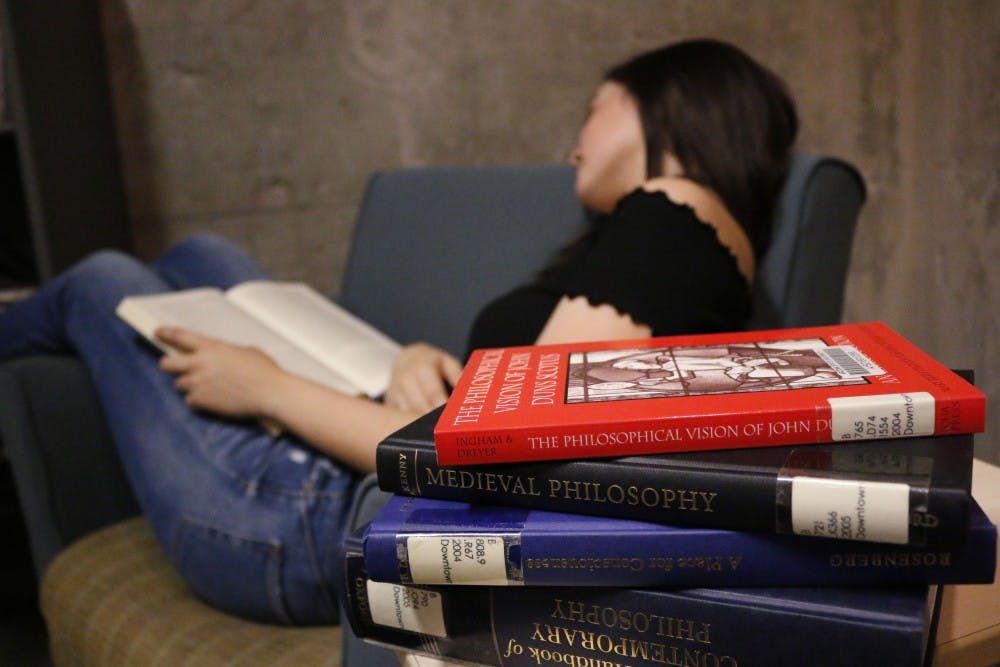The idea that college is a time where sleep must be put on the back burner is absurd. College students are not invincible and need sleep like every other person, though they may not believe so.
Universities urge students to grow in various ways, but the main goal of higher education is academic growth. However, students hinder their abilities to excel academically by getting insufficient sleep.
In college, students have very irregular sleep schedules. They pull all-nighters in the library and socialize with friends when they should probably be sleeping, causing sleep deprivation.
According to the National Center for Biotechnology Information, 50 percent of college students reported being sleepy during the day, and 70 percent receive less than eight hours of sleep.
Students assume that a lack of sleep doesn't affect them significantly. However, living an unhealthy lifestyle and not sleeping can lead to detrimental health issues.
Depression, anxiety, obesity, heart disease, high blood pressure and diabetes are all long-term health issues associated with sleep deprivation. In addition to these health issues, insufficient slumber affects the cognitive abilities of the brain and therefore one’s academic capabilities.
“Most obviously, people tend to see that with a lack of sleep, they are in an irritable mood, but there are a number of other cognitive and brain deficits that occur with sleep deprivation that affect learning, memory, attention, decision making and multitasking,” Megan Petrov, assistant professor in the College of Nursing and Health Innovation at ASU, said.
Everyone knows they should sleep, but sleep is often misunderstood. It is still not fully understood by scientists, but it is known that when we doze off our brains are still active.
“There are two main types of sleep, which are split into the categories of slow wave sleep and rapid eye movement sleep (REM). REM sleep is super important for memory consolidation. Slow wave sleep is the more neurologically restorative component of sleep, as this is when the brain drains toxins and combats damage,” Pierce Hutton, third year Ph.D student in the biology program and graduate teaching assistant at ASU, said.
In one night, we pass through five different phases of sleep from stage 1 to REM sleep. This cycle is repeated multiple times throughout the course of the night. REM sleep, in particular, is important to the memory storing process and learning.
“We are bombarded by all these new experiences and information during the day, and sleep is a way to filter through all that information and decide what is going to be of future relevance and filter out those tidbits of our experiences,” Petrov said.
“And then (the brain) stabilizes those little elements of the memory and integrates them with the rest of our experiences that are already consolidated and solidified in our brain.”
I am guilty of staying up way too late working on homework. I even had the, “I can’t afford to lose time sleeping when I could be doing something more efficient” attitude. However, I have come to realize that it's never too late to change your relationship with sleep and rid yourself of a sleep debt.
“You can pay off this sleep debt, but it takes some time. So if you stay up all night one night, it’s going to take days or even a week to pay off that debt,” Hutton said.
Leah Doane, associate psychology professor at ASU, said that a trick to getting the most out of sleep for memory consolidation is to learn information over a period of time, not the night before, so the brain can build on this network of information and make it easier to recall later.
By pulling all-nighters students are actually lowering the amount of information they will retain during their study session because sleep plays a major role in the consolidation process. In addition, the National Sleep Association recommends young adults between the ages of 18 and 25 get seven to nine hours of sleep a night, which seems to be a rare occurrence for college students.
Doane also stated that a consistent sleep schedule, not consuming caffeine at night and not using electronics before bed are all important to a healthy night of sleep and your brain’s ability to consolidate information.
Even though college culture makes staying up or out late seem like a normal thing, it is not okay for students to believe sleep deprivation won't effect or harm them.
All-nighters are counterproductive and do not allow the brain sufficient time to consolidate the information students are trying to cram into their head.
Reach the columnist at afsuthe1@asu.edu or follow @a_sutherland10 on Twitter.
Editor’s note: The opinions presented in this column are the author’s and do not imply any endorsement from The State Press or its editors.
Want to join the conversation? Send an email to opiniondesk.statepress@gmail.com. Keep letters under 500 words and be sure to include your university affiliation. Anonymity will not be granted.
Like The State Press on Facebook and follow @statepress on Twitter.




